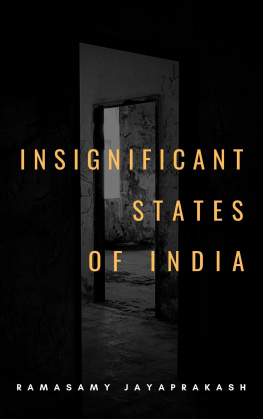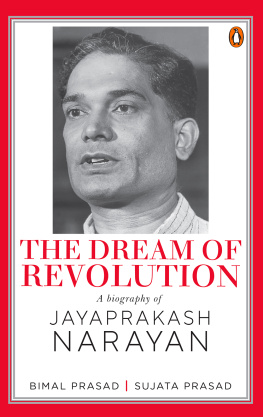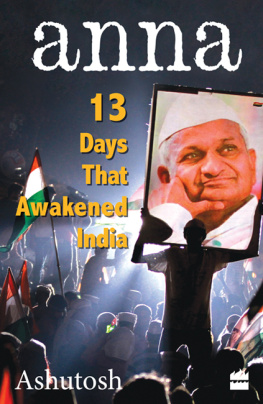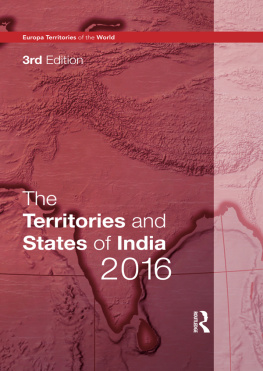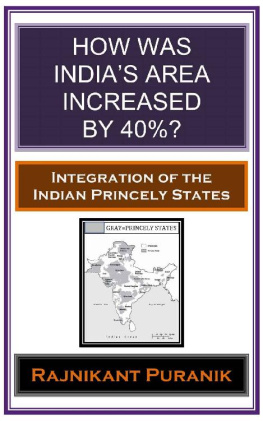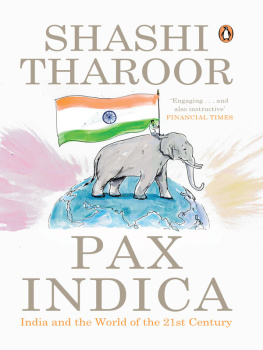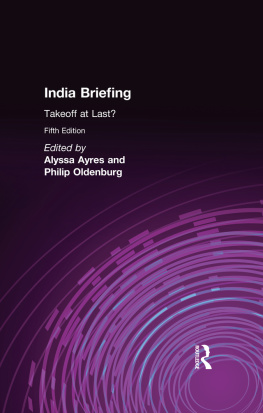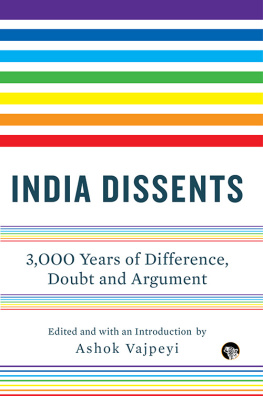RAMASAMY JAYAPRAKASH - Insignificant States of India
Here you can read online RAMASAMY JAYAPRAKASH - Insignificant States of India full text of the book (entire story) in english for free. Download pdf and epub, get meaning, cover and reviews about this ebook. year: 2019, genre: Politics. Description of the work, (preface) as well as reviews are available. Best literature library LitArk.com created for fans of good reading and offers a wide selection of genres:
Romance novel
Science fiction
Adventure
Detective
Science
History
Home and family
Prose
Art
Politics
Computer
Non-fiction
Religion
Business
Children
Humor
Choose a favorite category and find really read worthwhile books. Enjoy immersion in the world of imagination, feel the emotions of the characters or learn something new for yourself, make an fascinating discovery.
- Book:Insignificant States of India
- Author:
- Genre:
- Year:2019
- Rating:3 / 5
- Favourites:Add to favourites
- Your mark:
- 60
- 1
- 2
- 3
- 4
- 5
Insignificant States of India: summary, description and annotation
We offer to read an annotation, description, summary or preface (depends on what the author of the book "Insignificant States of India" wrote himself). If you haven't found the necessary information about the book — write in the comments, we will try to find it.
Insignificant States of India — read online for free the complete book (whole text) full work
Below is the text of the book, divided by pages. System saving the place of the last page read, allows you to conveniently read the book "Insignificant States of India" online for free, without having to search again every time where you left off. Put a bookmark, and you can go to the page where you finished reading at any time.
Font size:
Interval:
Bookmark:
I would like to thank the most important woman in my life. Without her support, motivation and encouragement this wouldnt have been possible for me.
Thank you
Amma
Dhilipan and his whole Family and friends
My Brother Dhayananth
Elamai Doss and Team
Inspired heavily from the works of
Perarignar C.N.Annadurai
Periyar E.V.Ramasamy
Kalaignar M.Karunanidhi
Aasiriyar K.Veeramani
Insignificant States of India
Introduction:
The titles abbreviate to ISI. But I would like to clarify that this has no connection to Pakistan or its Intelligence Agency in any way. This happened to be a simple coincidence. However, the contents of this book may tempt someone to call me Anti-National. I say to those, go ahead. I dont have a problem.
Many states are unhappy and feel insignificant in India. They feel either left out, under- represented, neglected, not adequately taken care of in times of calamity or all at once. How India, as a country, treats its states, is a matter of great importance and urgency. This will not be a detailed, end to end analysis with typically difficult usage of words, as the target audience for this exercise are those who are taking baby steps in understanding Indian politics and Political System just like me.
This is in no way written to insult the country India, as it is not my intention. Any insults perceived, is deeply regretted. The mere mentioning of the above disclaimers stand testimony to the kind of Political Climate and Free Speech the country has been witnessing in recent years. This is an honest opinion and criticism which I have. I am open to be proven wrong with evidence and profound actions.
Since I am from Tamil Nadu, how I have seen Politics unfold in Tamil Nadu and other States have prompted me to take up this exercise, from that vantage point. Among many other unique characteristics, Tamil Nadu is a state that has always been vocal about having complete State Autonomy. Whereas India being a quasi-federal nation, is the major cause for its dissatisfaction. When I probed a little further, I realized there are other states too with similar or worse conditions.
Except for the brief history of Tamil Nadu politics in the first few pages, all other topics would broadly be applicable and are relatable to many other states in India.
Politics of Tamil Nadu and Other States
Politics in each state is unique compared to the others and there cant be singularity in it. For example, right now the state of North Eastern States and almost all Opposition parties in India are fighting to fend off the imposition of Citizenship Amendment Bill which grants citizenship to the immigrants on a discriminatory basis to the Non-Muslims from Pakistan, Bangladesh and Afghanistan. The Bill talks nothing about granting citizenship to the Rohingya Muslims who faced discrimination and were exiled from Myanmar or about the thousands of refugees from Sri Lanka in hundreds of camps across Tamil Nadu who left their country because of an ethnic cleansing, Genocidal war. People of Jammu and Kashmir are protesting that their special status is deprived of them and are living in a complete lockdown. Similar, lockdowns and disconnection of internet is happening throughout the North Eastern States to prevent the people from communicating to each other. West Bengal is very aggressive in its opposition to the Centre and it is slowly building momentum in opposing Hindi Imposition. It also raises its voice for Federalism, while battling polarization of Hindus, Muslims and Dalits by right wing parties rapid growth in the State. The ruling parties in Andhra Pradesh and Telangana are slowly coming to terms with bifurcation and are living with a realization that they should have a significant voice for them at the Centre, as the bifurcation has reduced its collective strength in the Lok Sabha. Nagaland is in a struggle to attain a separate flag and Constitution for themselves. Tamil Nadu is battling to stop the onslaught of Hindutva forces who try to pierce the State directly and indirectly. Hence, no two states priorities and Politics can be considered the same and one should definitely never imagine that all the States of India and its people have just one agenda.
After Independence, almost all parts of India were ruled by the Congress party, both at the State and the Central Level. We lived in a one-Party rule mainly because of the magnetic appeal of Jawaharlal Nehru and other prominent Congress leaders in various states. But the Nation saw a sudden surge in Regional parties ascending to power in 1967 Assembly elections. After the death of Jawaharlal Nehru in 1964, the Congress party saw its first slide in popularity since it entered electoral politics. Congress lost Assembly elections of 8 states and the single party rule in India started losing its shape. Within a decade, the Congress party lost the General Elections for the first time in 1977. Since 1989, India has always been under a Coalition Government until 2014. After 2014, it seems like India is back on track with its One Party rule, but this time it is by a different player, with completely different tactics from Nehruvian era. MLAs and MPs in many states are bought off from the opposition parties by the Bharatiya Janata Party, in an attempt to topple Governments even in the states where they dont have a majority. We have seen that happen in Goa, Arunachal Pradesh, Karnataka, Sikkim, Maharashtra and the list could go on.
Even in Tamil Nadu, the entire AIADMK Government has become the torch bearers for their new masters in BJP. For the past 5 decades, starting from 1967 Tamil Nadu has been ruled only by either of the two Dravidian Parties. DMK or AIADMK. Here, we will address how the Dravidian Ideology has impacted politics in Tamil Nadu and how it is different from the Politics of other states, rather than focusing on the 2 Dravidian parties loyalty to the Dravidian principles as AIADMK would not even be in contention.
Significant portion of this chapter is dedicated to Tamil Nadu and how its Dravidian ideology came to be, as a conscious decision, because it is rather unique compared to other states. As the great C.N.Annadurai said in his maiden speech in Rajya Sabha,
I claim Sir, to come from a country, a part in India now, but which I think is of a different stock, not necessarily antagonistic. I belong to the Dravidian stock. I say that I belong to the Dravidian stock and that is only because I consider that the Dravidians have got something concrete, something distinct, something different to offer to the nation at large.
- C.N.Annadurai
We live in a world that has been evolving for around 4.5 billion years. Our planet earth has seen so much changes in its time and it is continuing to evolve each day. Similarly, Dravidian Ideology is one which has kept evolving right from its inception. The Big Bang of Dravidian Ideology is the publication of the book A Comparative Grammar of the Dravidian or South-Indian family of languages by Robert Caldwell in 1856. There was a popular belief that Sanskrit is the base for all Indian languages. People believed, every language, in one way or another, has come from Sanskrit. But Caldwell discovered that the South Indian languages are distinctive in nature and they are originated from a single proto-Dravidian mother language with Tamil being the oldest among them, rather than Sanskrit. This proposition created shock waves in a magnitude that can still be felt in Tamil Nadu politics even today. He put forth that there are two different linguistics/races at play here, namely Aryan (settlers) and Dravidians (Natives). This simple hypothesis sparked many movements, revolutions and political organizations in the decades to come.
The word, Dravidam, as it is called, originated as a Linguistic term used to differentiate South Indian Languages and North Indian languages. This led to many movements which can be traced back to AyothiDasar, the Great Grandfather of Dravidian Politics. He founded a newspaper called Dravida Pandiyan in 1885 and also created a political organization called Dravida Magajana Sabai in 1891. Ayothidasar advocated for a rationalist and casteless society based on Buddhist philosophies. He argued that is exactly how Tamils of the Sangam era lived. This idea of a separate identity and a history gave a sense of pride to a large number of individuals who are not very religious and are more practical in their thinking. He vigorously campaigned against superstitious principles and religious practices, which he considered, were imposed on Tamils after Aryan settlement.
Next pageFont size:
Interval:
Bookmark:
Similar books «Insignificant States of India»
Look at similar books to Insignificant States of India. We have selected literature similar in name and meaning in the hope of providing readers with more options to find new, interesting, not yet read works.
Discussion, reviews of the book Insignificant States of India and just readers' own opinions. Leave your comments, write what you think about the work, its meaning or the main characters. Specify what exactly you liked and what you didn't like, and why you think so.

